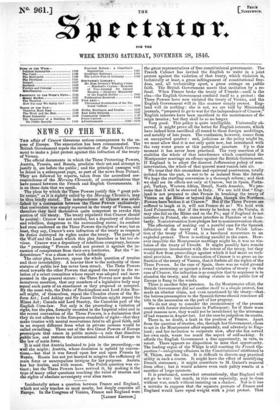NEWS OF THE WEEK.
Tem affair of Cracow threatens serious consequences to the re- of Europe. The annexation has been consummated. The re- pose Government repels the invitation of the French Govern- ment to make a joint protest against this infraction of the treaty of Vienna.
The official documents in which the Three Protecting Powers, Austria, Prussia, and Russia, proclaim their act and attempt to justify it, are before the public ; and the principal passages will be found in a subsequent page, as part of the news from Poland. They are followed by reports taken from the accredited cor-
respondence of the Mornzng reports, of communications that have passed between the French and English Governments. It is on these data that we speak. The pleas by which the Three Powers justify this "great pub- lic crime," as it is rightly called by the Morning Chronie!e, may be thus briefly stated. The independence of Cracow was estab- lished by a convention between the Three Powers exclusively ; that convention was simply repeated in the treaty of Vienna, and therefore. they hold themselves quite competent to revoke this portion of the treaty. The treaty stipulated that Cracow should' be neutral : Cracow was not neutral, but a depository of disorder and rebellion, dangerous to the surrounding states; its conduct had even conferred on the Three Powers the rights of war; but as least, they say, Cracow's own infraction of the treaty as respects its duties destroyed its rights under the treaty. The parody of the Wolf and the Lamb which this plea furnishes is but too ob- vious. Cracow was a depository, of rebellious conspiracy, because the " protecting " Powers could not protect it against the in- cursion of conspirators from their own territories. But the "in- dependence" was a sham not worth defending. The other plea, however, opens the whole question of treaties and their inviolability. A heavier blow to the authority of those statutes of public law has never been struck. The Three Powers stood towards the other Powers that signed the treaty in the re- lation of a select committee whose report was adopted and incor- porated in the general statute : the Three Powers now make the monstrous assertion that any members of a legislative body may repeal such parts assertion, enactment as they proposed or accepted. By the same rule, the Duke of Buckingham and Lord John Rus- sell might, of themselves, repeal the Chandos clause of the Re- form Act ; Lord Ashley and Sir James Graham might repeal the Mines Act ; Canada and Lord Stanley, the Canadian part of the English Corn-law. Not only is the proceeding a violation of right, but the plea, formally recorded in the Imperial edict and in the recent convention of the Three Powers, is a declaration that they do not adhere to the European standards of right—that they make treaties with mental reservations fatal to all good faith, and in no respect different from what in private persons would be called swindling. Three out of the five Great Powers of Europe promulgate that canon in public morals—a rule that dissolves public law, and restores the international relations of Europe to the law of main force.
It is said that Austria hesitated to join in the proceeding,—as well she might; Austria, whose dominion is upheld by conven- tions,—but that it was forced upon her and upon Prussia by Russia. Russia has not yet learned to misgive the sufficiency of main force or unscrupulous intrigue for her purposes. Austria has her doubts, and with reason. The Polish question was ex- tinct; but the Three Powers have revived it, by making it the type of many other questions touching the value of treattes and the rights of absolute sovereignty over alien races.


























